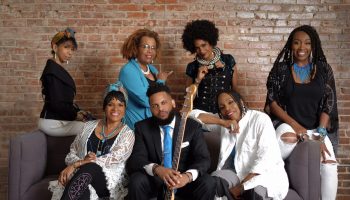
“From our reading from Ephesians 2 this morning, we believe that Christ has broken down all dividing walls, brought peace to all of us. We all have access to one Spirit, so there are no longer aliens among us. Or are there?” the Rev. Suzanne Wenonah Duchesne asked. She preached at the 9:15 a.m. Wednesday morning worship service in the Amphitheater. Her sermon title was “Aliens Among Us,” and the scripture reading was Ephesians 2:13–22.
Duchesne recalled a sermon preached in 2015 by her friend Judy Deere, a Muscogee woman. Deere said that this scripture was used to exclude Native people from full membership in the Christian community. Native people were considered aliens by the Euro-Christian settlers before conversion, and if they did not sever their ties with traditional culture, they would remain aliens.
“The Greek word (paroikoi) means strangers or aliens, or even demonic,” Duchesne said, “and Euro-Christian people could only see perpetual alienation from Christ and justified the ‘othering’ of people.”
She continued, “Settlers were homogenized, and differences were erased. My ancestors, like every wave of immigrants, were taught to conform. We must be differentiated from what we are not. Our racial characteristics are based on constructions to create the other.”
Native people and nations, Duchesne noted, are as different from each other as Germans, French or Italians or Austrians. “The twist,” she said, “the irony, is that Indigenous people are not the aliens; those who are not Native are the aliens.”
Duchesne said, “No matter who arrived from other places, they are the aliens trying to fit into a colonizing identity and were told to leave behind what makes them unique and what makes them blessed. We created categories to create separation from the Indigenous people to the point that we romanticize them and claim even a hint of Indigenous ancestry.”
When Duchesne first started listening to Native women in Oklahoma, they asked who her people were. “I’m from New Jersey,” she said. “No,” they said. “I am a United Methodist clergywoman.” “No,” they said. “Well, my family are farmers in Pennsylvania,” she said. “No,” they said.
She continued, “I learned, through deep digging, that my family is from Ireland, France and Nigeria. My name, ‘Wenonah,’ is a Lakota name that has been passed down to six generations of women in my family. To become an ally takes a lifetime of work, and until we know who we are, we can’t be grounded enough to truly listen.”
To unmask the alienated parts of our identity, she told the congregation, requires more than a DNA test. There are dead ends for some people, especially those who were brought to the United States against their will.
One thing Duchesne learned from her work with the women in Oklahoma was “in the final analysis, they want to be seen as human beings. None of us are aliens; all of us are children of God. We are beloved in our differences and in our common humanity.”
The Rev. James Daprile, president of the Catholic House at Chautauqua, presided. Melissa Spas, vice president for religion at Chautauqua, read the scripture. Organ scholar Owen Reyda performed “Melody,” by Hubert Parry, for the prelude on the Massey Memorial Organ. For the anthem, the Motet Choir, under the direction of organ scholar Laura Smith and accompanied by Reyda on the Massey organ, sang “Unless the Lord Builds this House,” music by Alfred V. Fedak, text from Psalm 127, 118 and Matthew 21. Smith performed “Processional,” by Grayston Ives, for the postlude on the Massey organ. Joshua Stafford, director of sacred music and the Jared Jacobsen Chair for the Organist, has been in San Diego playing the Spreckels Organ in Balboa Park and his plane connections home were canceled, delaying his return. Support for this week’s chaplaincy and preaching is provided by the Mr. and Mrs. William Uhler Follansbee Memorial Chaplaincy.




